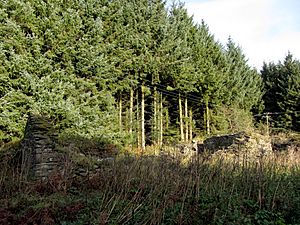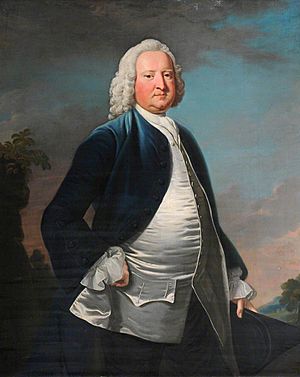David Morgan (Jacobite) facts for kids
David Morgan (born around 1695, died July 30, 1746) was a lawyer from Wales. He was also a Jacobite, which means he supported the House of Stuart family's claim to be the rightful kings of Britain, even though they were in exile.
Morgan is remembered because he was one of the few Welshmen who joined the Jacobite rising of 1745. During this rebellion, he briefly served in a group called 'Lord Elcho's Life Guards' and helped create the Manchester Regiment. He didn't want to go back to Scotland with the rest of the Jacobite army. Because of this, the government arrested him near Stone, Staffordshire. He was tried and executed in July 1746.
Contents
David Morgan's Early Life
David Morgan was born around 1695, likely in Glamorganshire, Wales. His family was part of the "small gentry," meaning they owned some land and were well-connected. His father, Thomas Morgan, was the second son of a landowner named William Morgan. His mother, Dorothy, was the granddaughter of a baronet, Sir Edmund Stradling. This also made him a cousin of Admiral Thomas Mathews.
We don't know much about Morgan's early life. He went to Christ Church, Oxford university but didn't finish his degree. He studied law and became a lawyer in 1721 at the Middle Temple in London. Even though he was known in Westminster (where the government is), he spent a lot of time at his father's home, Penygraig. This place is near what is now Edwardsville, Merthyr Tydfil. Some of his poems suggest he worked as a lawyer in Wales. However, he later said he "never pretended to much knowledge" about law. He might have also been an officer in the British Army. At his trial, he mentioned serving the "crown of England in two campaigns." He earned much of his money from properties in Shoreditch that he got through his marriage.
In the early 1700s, some wealthy Welsh families still supported the exiled Stuart family. The most important Welsh Jacobite was Sir Watkin Williams-Wynn, 3rd Baronet. He was a powerful landowner and a Member of Parliament. Wynn said he would support the Stuarts if France helped them with soldiers. His political group, the 'Cycle of the White Rose,' was a center for Jacobite activities in North Wales. In South Wales, a similar group called the 'Sea Serjeants' was led by Sir John Philipps.
Morgan was friends with both Wynn and Philipps. He was also close to the Duke of Beaufort, another important person who supported the Jacobites. Morgan was a key member of the "Independent Electors of Westminster," a pro-Jacobite club in London. He wrote several poems about Jacobite ideas, including The Country Bard in 1739.
Joining the 1745 Rising
When the Stuart heir, Charles Edward Stuart (also known as Bonnie Prince Charlie), arrived in Scotland in July 1745, he expected a lot of support from Wales. This was based on old information from France. While some people in Wales did secretly support him, most wealthy Welsh families were worried about the rebellion. They feared it would lead to a bloody civil war, not the peaceful return of the Stuarts they hoped for. They saw it as a Scottish conflict and felt Charles was allied with "Highlanders," not with British political groups. Wynn was watched closely by the government. He only sent vague messages of support to the Jacobites. In the end, Morgan, along with William Vaughan and his brother Richard, were among the very few wealthy Welshmen to join the rebellion.
Morgan's reasons for joining were partly based on his beliefs. He believed in the Stuarts' right to the throne and disliked high taxes and the standing army. He was also a 'High Church' nonjuring Anglican, meaning he didn't accept the new kings. He later admitted that if his "personal Affairs" had been better, he might not have joined.
People say Morgan heard about Charles's arrival from members of Philipps’ ‘Sea Serjeants’. He left Penygraig in early November and rode to Spetchley Park, Worcestershire. There, he met William Vaughan. Pretending to be on a hunting trip, they traveled to northern England. They met the Jacobite army near Preston on November 27, along with Francis Towneley, a Catholic from Lancashire. In Manchester, about 200 English volunteers formed the Manchester Regiment. Morgan was an Anglican and had connections to Beaufort, which made him a good choice for colonel. However, the position went to Towneley. Morgan was made a captain and was in charge of choosing the regiment's junior officers. Some people said he was Charles's "counsellor" or legal advisor, but he denied this at his trial. He seemed to serve only as a military officer. One of his main jobs was to find weapons for the Jacobites.
Charles had promised that many English recruits would join as they marched towards London. But very few did. At Derby on December 5, the Jacobite leaders decided to turn back and strengthen their position in Scotland. They thought about going to Wales but decided against it. Another message was sent to Wynn, hoping his joining would inspire others, but the messenger was caught.
Like Charles, Morgan felt that turning back ruined their best chance. He told Sir John MacDonald that "all was lost." He also told Vaughan that he would "rather be hanged than go to Scotland to starve." Vaughan stayed with the army, but Morgan left on the evening of December 7 at Ashbourne. He headed south with a guide and was arrested by government forces near Stone, Staffordshire.
The Jacobites continued north to Carlisle. Towneley and most of the Manchester Regiment stayed there as a guard. After a short siege, they surrendered to Cumberland's government army on December 30. Vaughan continued north with the main Jacobite force. After the rebellion ended at Culloden in April 1746, he managed to escape the country.
Trial and Execution
Morgan was held at Newgate Prison with other important Jacobites. He was put on trial on July 18, 1746. Even though he gave a "lengthy and ingenious defence," he was found guilty of treason. He was sentenced to be executed.
He was executed on July 30 at Kennington Common. Towneley and several other officers from the Manchester Regiment were executed with him. Morgan seemed calm about his fate. Some reports say he complained angrily about the coffee the prisoners were given just before they were taken to be executed. At the scaffold (the platform where executions happened), he led the others in prayer for about thirty minutes. He also handed out copies of his final speech. In his speech, like Towneley's, Morgan strongly repeated his beliefs. He criticized the Hanoverian kings, calling them "foreign usurpers" and saying that "a lawful king is a nursing father who would protect us." After the execution, his remains were likely buried in the cemetery next to the Foundling Hospital, which is now St George's Gardens in Bloomsbury.
Legacy of David Morgan
Even though Wynn continued his secret activities and Welsh Jacobite clubs lasted into the 1800s, Morgan's death and the lack of action from other Welsh supporters effectively ended Welsh Jacobitism. However, like Towneley, Morgan became an inspiration for Jacobites in other parts of Britain for a while. His execution gave new energy to the Independent Electors of Westminster, the club he belonged to. It also led to more Jacobite activities after 1745.
Stories about people like Morgan and David Jenkins made later historians think that wealthy Welsh families in the countryside were extremely loyal to the king or "fanatical Tories." But this idea was mostly a "myth." Morgan also interested Welsh "Celticist" nationalists of Cymru Fydd. In 1901, the magazine Young Wales published a poem by W. Llewelyn Williams. In the poem, Morgan, waiting for his execution, regrets that his cause was betrayed by Wynn and other Welsh gentry, bringing "shame" to "Our gallant country." Another nationalist writer, Arthur Owen Vaughan (also known as "Owen Rhoscomyl"), used Morgan's story for his 1897 historical novel, For the White Rose of Arno.
Family Life
Morgan was married, and his wife reportedly visited him often while he was in prison. They had at least one daughter named Mary. She later inherited Morgan's properties and died unmarried before 1798.
 | John T. Biggers |
 | Thomas Blackshear |
 | Mark Bradford |
 | Beverly Buchanan |



